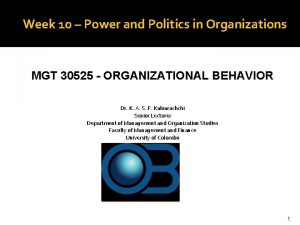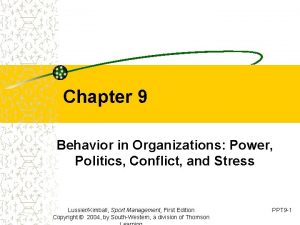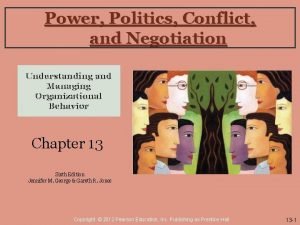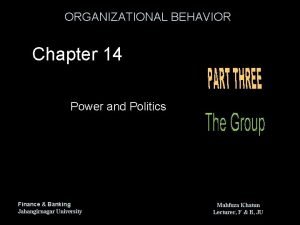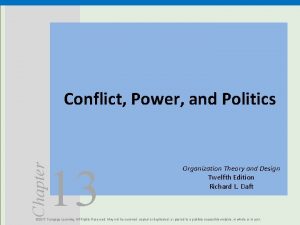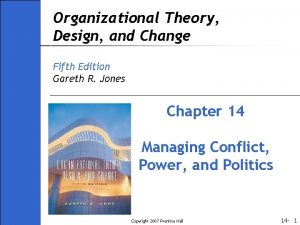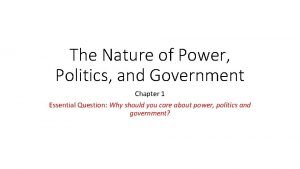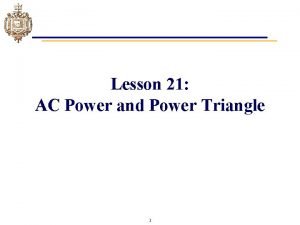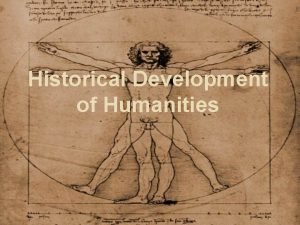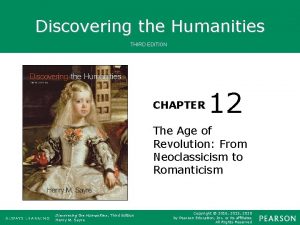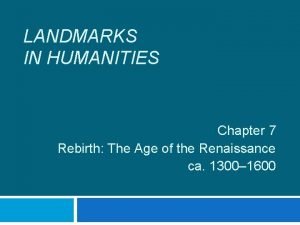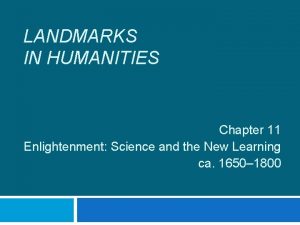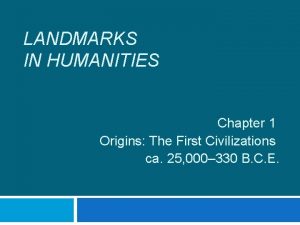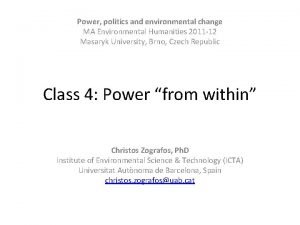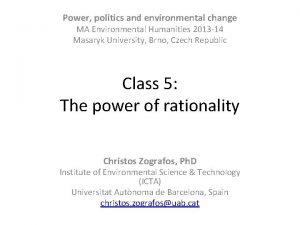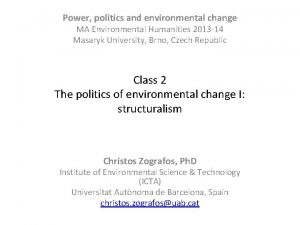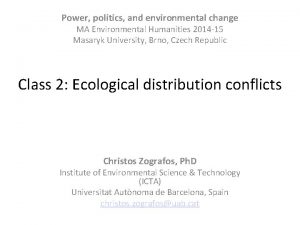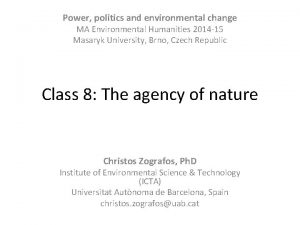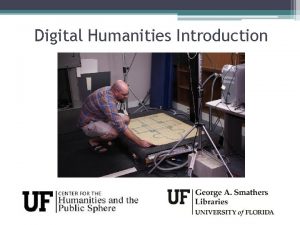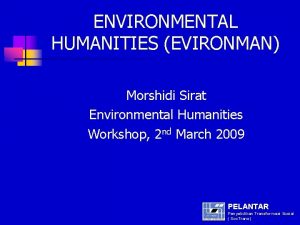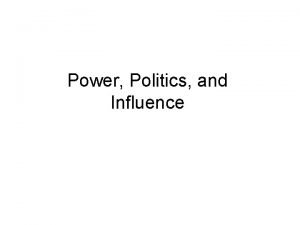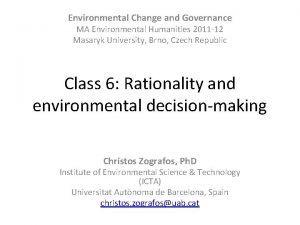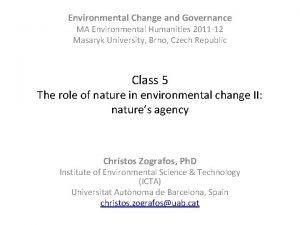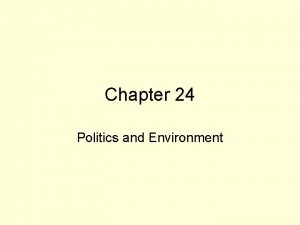Power politics and environmental change MA Environmental Humanities



















- Slides: 19

Power, politics and environmental change MA Environmental Humanities 2014 -15 Masaryk University, Brno, Czech Republic Class 1: Introduction Christos Zografos, Ph. D Institute of Environmental Science & Technology (ICTA) Universitat Autònoma de Barcelona, Spain christos. zografos@uab. cat

Introduction • Purpose of this class: – Introduce course – Introduce some key terms for course • Why you should know these: – Know what is expected and by when – Background to develop rest of course 2

Class outline • Introduction to the course • Quickly take you through topics and some key concepts to be presented in classes • The political 'character' of environmental change 3

But before, let’s introduce ourselves! • CZ: – Current post – Education – Thesis – Research interests • What about you? – Where do you come from? – Background (academic, professional) 4

Block 1 INTRODUCTION TO THE COURSE 5

Course aims Mission statement: power and politics shape the environment we live in; but also, power and politics are shaped by the environment we live in (last part of course) If this is so, explain how to study the influence of power upon environment: different ways in which power shapes nature but also human-environment relationships Environmental Social Science: political ecology and environmental history 6

Learning outcomes • After the end of the module, students should be in a position to: 1. 2. Explain how power and politics are useful for understanding and studying environmental change Use several ‘models’ of how power operates to explain the role politics play in producing environmental change 7

Structure of classes 1/2 Class Day Time Room Thursday 12 March 17: 00 -18: 30 P 52 Friday 13 March 09: 45 -11: 15 P 52 1 Introduction 2 Ecological distribution conflicts 3 Green materialism Monday 16 March 18: 45 -20: 15 U 34 4 The power of structures Tuesday 17 March 18: 45 -20: 15 U 34 5 ‘Open clinic’ session Wednesday 18 March 17: 00 -20: 15 U 34 6 The power from within Thursday 19 March 18: 45 -20: 15 U 34 7 Incomplete dominations: post-structuralism Friday 20 March 15: 00 -16: 45 M 117 8 The agency of nature Monday 23 March 18: 45 -20: 15 U 34 9 The force of nature Tuesday 24 March 08: 00 -10: 15 P 52 8

Structure of classes 2/2 • • • Classes 3, 4, 6, 7 and 8 – reading + answer question • Upload answers 2 hours before class – In class: discuss answers – Feedback on your answers: clinic session – if want more, ask Class 9: watch video - class discussion; no reading Class 5: Clinic session: my feedback + any other questions you may have 9

Course evaluation 1/2 Evaluation tool Portion of final mark Final essay 75% of final mark Class participation (including answers to class questions) 25% of final mark 10

Course evaluation 2/2 Essay (75%) • • • Max 3, 000 words (excluding references) Deadline: Friday 23 April 2015 – Late submissions: ‘Fail’ Individual or Collective essay – Collective: maximum 2 students per group – Group will produce one essay – I mark the essay, i. e. both students get same mark Topic Questions on topic? Performance criteria: – – • data collection analysis of power and politics role at different scales • How do they produce vulnerability • How they interact with other factors, e. g. climatic ones, to produce vulnarability • How this happens at different scales, e. g. int’l negotiations on climate change, local political decisions, etc. Class participation (25%) • • • Student commitment and performance in answering class assignment: 5% per assigment Also: eager to participate and constructive comments I don’t provide feedback to each class assignment (class answers should indicate this) but will do in Clinic Session +more than happy to do so if you ask me Grades: • • I personally mark all assignments using ECTS marking scheme: a, b, c, d, e and f: for fail But: for MUNI system purposes I only assign ‘Pass’ or ‘Fail’ i. e. if you want to know more about your mark, email me Erasmus students: need grades before? Contact me Use and misuse of start-up documents 11

A note on answering assignments File name of your assignments – Your_name_assignmentnumber – E. g. Christos Zografos 3 NOTHING ELSE PLEASE! • How to answer – First, answer the question, e. g. in one sentence – Then, substantiate, support your answer with arguments and evidence from the text • Avoid being descriptive: don’t answer by simply describing a situation and don’t re-state what the question says! • Instead, try to be analytical (freedictionary): “reasoning or acting from a perception of the parts and interrelations of a subject” • Support, substantiate your answer: show (1) what are the key factors in the issue; and (2) their interrelations (how they relate to each other) 12

Other • Can reach me through my email christos. zografos@uab. cat • Help with English (unknown words): http: //dictionary. cambridge. org/ • Do you have any questions re: course programme, structure, outputs, etc. ? 13

Block 2 POLITICAL ‘CHARACTER’ OF ENVIRONMENTAL CHANGE 14

Political ecology (Simsik, 2007) • Academic field that seeks to understand relationship human societies – nature • PE: puts politics in the centre of its explanation of the relationship – E. g. environmental change (major topic of focus for PE) is political – But what exactly do we mean by ‘political’? 15

Political Power • “Political”: practices + processes through which power is yielded and negotiated (Paulson et al. , 2005) • But: what is power? • Power: key analytical term in politics – Yield: “give up control or responsibility of something” (Cambridge Dictionary) • Politics: study of power – Other definitions: “art of government”, etc. – Max Weber: “chance of a man or a number of men to realise their own will in a social action even against the resistance of others” – Social relation built on asymmetrical distributions of resources and risks (Hornborg, 2001) 16

“Environmental change is political” • How do we see this in the Robbins text? How has power shaped the “current environment in Yellowstone? ” The current environment in Yellowstone is the result of power struggles between different actors who have different priorities re: what to do with environment and how to do it Which actors? What priorities? Actors: Native Americans, etc. (humans); fire (i. e. nature) Priorities: Designed to produce: elk for hunters; wolves for scientists & environmentalists; open range for wildlife; vistas for visitors • Important (explanation): whose view dominates? – Not one that any of parties would want: “political actors create ecology of Yellowstone, but not Yellowstone of their own choosing” - NOTE: power asymmetries – “Complicated interactions: create world of un-intended consequences”� 17

Political ecology (PE) • Changes in ecology and landscape are not a-political – e. g. eco-scarcity position : environmental conflict is the result of limited/ scarce (not enough) natural resources available for satisfying human needs • Instead PE says change is political: environmental change is a result of specific public decisions, which are not unavoidable (matter of choice) – Decisions artificially create NR scarcity and conflict 18

Operation of power Course focuses on explaining “how does power operate? ” or else show different ways in which political and economic power interact with each other and with nature to shape ecology and humans • Illustrate some ways in which power operates In this course, we examine three main approaches: Power forces from ‘the outside', in particular social structures (cl. 4) and can be incomplete (cl. 7) Power is exercised within individuals (class 6) Traditional view: dominance, hegemony, subjugation, marginalisation, neglect people internalise power by learning, accepting, an not breaking rules of how to act Not only social but also ‘natural’ systems exercise power (cl. 8, 9 - env hist) Also: major explanation (PE) “why” environmental change+ conflict happen (cl. 3) illustrate how PE studies env change and conflict as political (cl. 2) – NEXT 19
 Power and politics in organizations
Power and politics in organizations Power, politics and conflict in organizations
Power, politics and conflict in organizations Power, politics and conflict in organizations
Power, politics and conflict in organizations Illegitimate political behaviour
Illegitimate political behaviour Power and politics organization theory
Power and politics organization theory Power and politics
Power and politics The nature of power politics and government
The nature of power politics and government Power definition
Power definition Real power formula
Real power formula College of humanities and social sciences
College of humanities and social sciences Columbus humanities arts and technology academy
Columbus humanities arts and technology academy Arts and humanities endorsement
Arts and humanities endorsement Ihsst
Ihsst Arts and humanities endorsement
Arts and humanities endorsement Historical background of humanities
Historical background of humanities Discovering the humanities 3rd edition
Discovering the humanities 3rd edition What is medical humanities
What is medical humanities Where was the early renaissance (ca. 1400-1490) centered?
Where was the early renaissance (ca. 1400-1490) centered? Landmarks in humanities 4th edition
Landmarks in humanities 4th edition Landmarks in humanities 5th edition chapter 1
Landmarks in humanities 5th edition chapter 1
